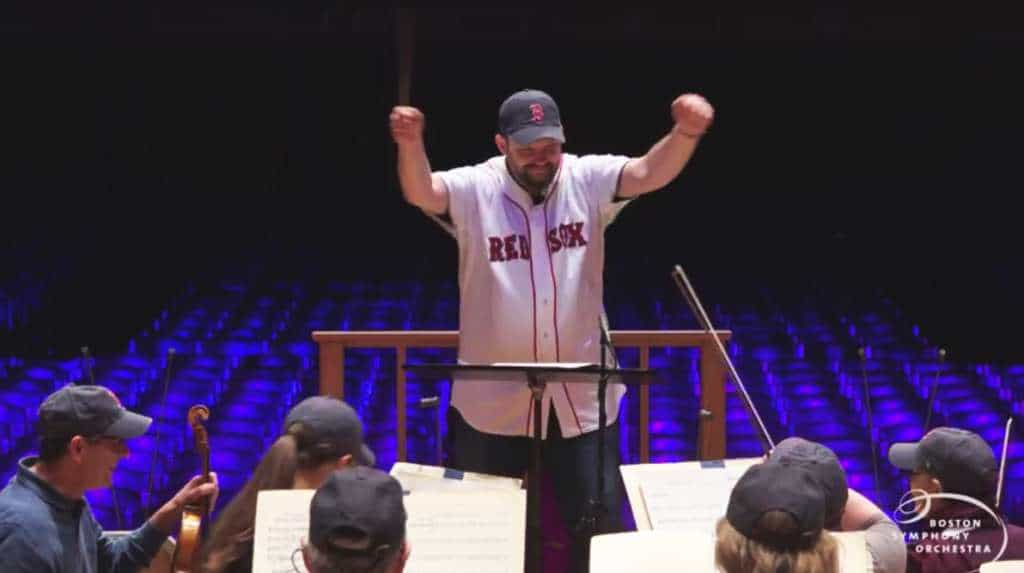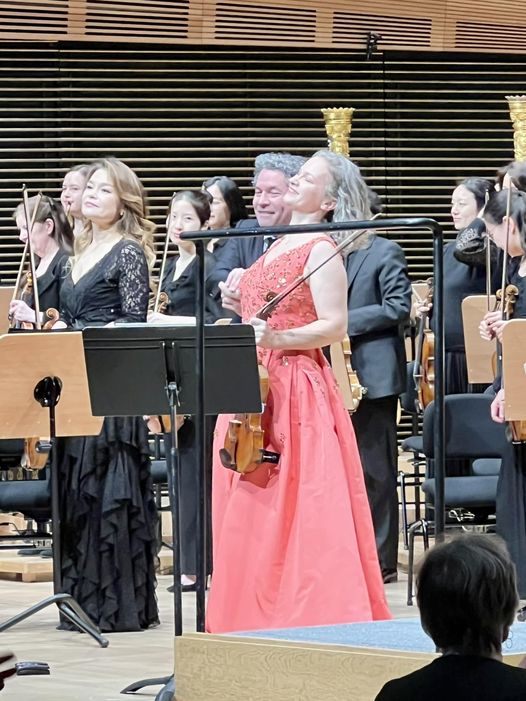Has Boston just made it easier to sack a conductor?
OrchestrasThis piece of evidently informed speculation comes from Zachary Woolf, chief music critic of the New York Times, in a review of the Boston Symphony’s visit to Carnegie Hall.
Woolfe concludes: This trip to Carnegie was the orchestra’s first with Chad Smith — long a forward-thinking programming leader at the adventurous Los Angeles Philharmonic, and now Boston’s chief executive. Midway through his first season, he’s beginning to lay the groundwork for the future.
Last week, the orchestra announced that Nelsons, after 10 years, would move to an unusual “evergreen, rolling contract.” Is this a sign of trust in a beloved partner? Or does it make it simpler for Smith to jettison Nelsons if a better option — a talented conductor in a more progressive mold — comes around?
The answer may well be both, and this Carnegie series gave ample evidence that Nelsons, for all his strengths, remains one of the most uneven top-rank maestros in music.






Impossible to say without knowing the contractual details about periods of notice for both sides.
Hard to imagine, camp Nelsons would have agreed to less than three years advance notice. Why should they? (his previous extension was for three years until the end of season 24/25)
Camp Nelsons doesn’t hold all the chips, it’s not like the Concertgebouw or Berlin will be calling in the next decade (or for that matter, neither will Cleveland or Chicago or Los Angeles…)
Whereas there is always some bright young thing popping out of Finland or Venezuela…
I mean, he is literally the Gewandhauskapellmeister. Apart from in purely financial terms, there isn’t a single orchestra in the US that comes even knee-high to that.
Here is another unsubstantiated subjective opinion — Baloney!
Prestige apart, for most of the 20th century the Gewandhauorchester was second rate. Listen to the recordings.
Nothing, alas, has survived from Furtwangler and Bruno Walter. But we have documents from virtually every other Gewandhauskapellmeister from with Hermann Abendroth on.
The orchestra does indeed has its own tradition. Notice the dark yet transparent sound of the strings. But the woodwinds and brasses were nothing special. The ensemble became more disciplined during Kurt Masur’s tenure, less so during that of Herbert Blomstedt, whatever his other qualities may have been.
The playing has noticeably improved during when Riccardo Chailly took over, but also became somewhat impersonal. Did not hear the orchestra under Nelsons.
And for such a prestigious ensemble, it is remarcable that so few of their recordings are top choice. Even some I once held in high esteem have not aged well. Elias under Sawallisch for instance, though Elly Ameling *is* lovely. Or Bruckner 5th under Konwitschny, which can’t hold a candle to Carl Schuricht’s amazing live performance with the Vienna Philharmonic.
Maybe the exception is Liszt’s tone poems under Masur, but this is the default choice for the whole set (Arpad Joo has an even worse orchestra and Haitink is dull). Even here, none of the performances equal the truly great Liszt recordings from Mengelberg (Les Preludes) or Silvestri (Tasso) – or Bernstein for the Faust Symphony.
Masur’s Brahms symphonic cycle with the Gewandhaus is spectacular.
Still have the LPs for that one but found no reason to replace them with CDs. In any case, no match for Celibidache, Furtwängler, Klemperer, or one-offs from Kleiber or Monteux. Even Ansermet, in spite of his not-so-great orchestra, gives more pleasure. And if I want just to hear great orchestra, there are the recordings of Karl Böhm with the VPO or Ormandy in Philly (come to think, Stokowski’s Brahms is also wonderful).
There was another famous cycle coming out of the former DDR: the Sanderling / Dresden Staatskapelle one. Better than Masur in both playing and interpretation, but still overrated; in any case not one that I turn to.
But, come to think, there are Gewandhauorchester recording that I listen to with some frequency: the Bach cantatas under Günther Ramin. Technical mess: Ramin was not allowed too much if any orchestral rehearsal (though how hard is this music, which the orchestra should have in its bones?) But musically puts any HIP-ster to shame.
Actually, the Bach cantatas under Georg Christoph Biller are marvelous as well, though by this time the orchestra has gotten better. As for the recordings of Kurt Thomas and Hans-Joachim Rotzsch, the only reason to hear them is for the marvelous singing of Elisabeth Grümmer for Thomas and Arleen Auger for Rotzsch. Though Auger is better heard under Rilling.
Informed and interesting opinion from Don Ciccio. Leipzig was not at his best under Masur , which was a good but not overwhelming and intense conductor ( let’s imagine if Tennstedt could have become it’s musical director…) . You rightly quote Konwitschny, that’s pure German tradition in Beethoven and Schumann, real classics in the vein of Schmidt Isserstedt…a conductor of weight….
Let’s come to my point, you forgot about an important part of orchestra s history… tenure of Vaclav Neumann after Konwitschny…his Mahler particularly with dark colors is impressive….or Bruckner ‘ s first symphony. Speaking of Bruckner, recording of 6th with Leipzig and the relatively forgotten Heinz Bongartz is absolutely stunning with glorious brass. An absolute gem and hidden treasure in Bruckner s discography. The orchestra could be one of the best, but not with Masur…
What does this mean: “remains one of the most uneven top-rank maestros in music”?
Nelsons is very much a “from the guts” musician. He is the type who can pull it off in the concert. That naturally makes it unreliable, depending on daily form, but also yields exciting results at times. It all has pros and cons. A Franz Welser-Möst is probably a more “thinking it through” musician, but then doesn’t have the same irrational power of seduction in the concert. People are different. C’est la vie. If either side is described positively or negatively is very much a matter of perspective. Glass half full or half empty kind of perspective.
Who is going to challenge Nelsons to be better prepared? (which probably would mean to take on a few less gigs per year, something his agent would hate.) The market?
I have heard Nelsons draw a warm orchestral sound from the BSO, but never a coherent and gripping slow movement.
Do you know any living conductor who has?
Admittedly I had to think. Blomstedt sounded very convincing to me in the entire Bruckner 4th, with the BSO, in 2022. He also conducted a Mozart Concerto really well, also in the slow movement. By contrast, I’ve heard Nelsons conduct two Mozart concertos and be very dull. The contrast with the great soloists, Goode and Bronfman, was stark.
This flows both ways. I imagine that Nelsons prefers not to be locked into a longterm contract — should another opportunity come around, he doesn’t want to be stuck waiting out a long contract to end.
Well let’s see. Woolfe’s review is bang on the money for the first program which I attended though he doesn’t review the pianist’s contribution which was very fine in the Ravel concerto and in Un Sospiro for a lovely encore. The orchestra was far too loud in the Ravel and also very loud in the Rite. But loud doesn’t always mean exciting. The performance lacked the kind of driven rhythmic intensity and nervous energy the best performances have (think Ozawa/CSO and Markevitch). The final dance should be breathless, here it was ponderous and still managed a few miscounted entries among the string desks………..
Zachary Woolfe is a political hack. Perhaps the worst New York Times music critic of all time. Despite a Princeton education, his knowledge of classical music and opera is third rate. His historical knowledge is less than third rate. (To make this a Haiku)
He was a DEI hire.
I haven’t met him, so I have no knowledge of how he fits into the DEI equation (he started writing for the paper quite a few years ago, before we were throwing around the acronym), but I have to agree that his criticism is shallow, and the political gossip at the end of that review is toxic (which unfortunately gets clicks, both at the New York Times, and here). He wrote an autobiographical article a few years ago where he talked about playing cello in the Princeton orchestra when he was a student there, so that is his credential; like the majority of critics that the paper has hired for decades, he isn’t an active musician and has no credentials in music.
I still remember quite clearly a certain critic that was hired by the paper back at the turn of the century that said this about the beginning of the Rite of Spring with Barenboim and Chicago: “pulling a deliberately coarse sound from his winds (in the archaic sound of the awakening oboe)”, and had this to say about the last movement of Mahler’s Third Symphony in a performance by Eschenbach and Philadelphia: ” its towering climax, extended almost beyond endurance over the bulls-eye strikes of the bass drum”. Imagine hiring a critic to review an orchestra concert that doesn’t know an oboe from a bassoon, or the bass drum from the Timpani…(and this critic moved on to become the chief music critic for the Washington Post a few years later). Music is a subjective field, and unfortunately, that leads to a lot of questionable hiring at a paper where the person doing the hiring has even less knowledge than the person being hired.
Maybe the maestro wanted the evergreen contract so he could leave at any time, according to his wishes, not the BSO. Just a thought.
Uneven is a good word. At the Proms in London last year, BSO/Nelsons delivered a limp and uninvolved Prokofiev 5. Last night at Carnegie Hall, orchestra and conductor were on fire throughout Lady Macbeth of the Mtsensk District – a stunning performance!
Is he trying to cosplay Fleischmann? Smith does not seem to have the same talent, knowledge, foresight, and managerial wherewithal. I hope this doesn’t end in disaster.
With all due respect, Zachary Woolfe’s “thesis” is absurd. Chad Smith does not determine whether or not Andris Nelsons stays or goes; the Board of Trustees does. Chad Smith works for the Board, not the other way around. If the Board wants Nelsons to stay, he stays regardless of what Chad Smith wants. If the Board wants Nelsons to go, he goes.
It’s misguided of Woolfe to suggest Chad Smith has power here he absolutely does not have. And as someone new to the BSO team, if he’s foolish enough to think he can guide the board to such a decision against the Board’s own will/instincts, he’ll soon be out the door himself.
I’m not a fan of Zachary Woolfe as a critic, and it’s no surprise to see something so ridiculous put in print.
Can someone explain to me exactly why Woolfe has the prestigious NYT job he has? I don’t get it.
It has been more than a decade since anything at the NYT has been prestigious.
I wish Leipzig would put him out to pasture.
It seems to me that Mr. Nelsons evergreen contract could just as likely be at his suggestion.
It would keep him free to pursue other positions, such as The Berlin Philharmonic without first having to complete an existing contract as is the case with Mr. Dudamel and the N.Y. Philharmonic.
BPO is not close to let Petrenko go, but he could go by himself…
He has barely arrived in Boston and already according to his people in the press (Alex Ross and the hacks at NY Times who take dictation from Alex Ross and Amanda Ameer) he is the Most Important Person in the organization, ready to “jettison” the well-liked music director…! I can guarantee should Nelsons become fed up with him and leave, the “talented conductor in a more progressive mold” will be someone unqualified and intensely disliked by the orchestra, deliberately chosen so that he and the press will have more leverage over the conductor: if she doesn’t want to lose her job and end up a failure, she will do Smith’s bidding to push his political agendas and cooperate with the journalists to supply the increasingly pointless classical press with “relevant” stories.
The US is becoming an increasingly strange place for classical music. Over the last decades, the highly technically skilled – but generally musically uninspired – top orchestras have mostly imported international – mostly old school European – conductors, “inspired maestros”, to inject some life and musical blood into the otherwise cold and technocratic classical music ivory towers. (and one Venezuelan major talent who resides in Europe as well by now.)
Now that stream of generations of old world schooled maestros seems to be drying out. We will see a transitional phase of “bright young things” and “woke programming” for a while, which will just increase the speed of the downward trajectory.
Who finds the meaning of classical music again in these dumb and dumber times? America, you had it good, but you lost the aspiration for meaning. The meaning that is not about money.
Transition to what, I might ask?
Of course, they could just hire the deep and thoughtful conductors that major European orchestras hire, like Makela…
Of course, you also forgot that Nelsons has a major European orchestra as well. Or that Boston is easily as capable of playing a musically inspired concert as the major European Orchestras at present when conducted by someone like Nelsons (who has conducted his share of revelatory performances).
It may be relevant that Nelsons opted for a similar ‘rolling’ contract with the CBSO after a few years – the sense in Birmingham was very much that this was done on his initiative, though maybe someone more in the know could confirm or deny this. As to his ‘unevenness’ – that was to be honest my impression in Birmingham also. He could of course be fantastic (not least in concert performances of operas), but there were other evenings when it was all a bit workaday. Those evenings seemed generally to coincide with his looking physically exhausted (I hope for his own sake he’s got a bit better at saying ‘no’ to invitations), but for all I know it might also reflect something about his musical personality.
Hmmm . . . Nothing better to do than engage in speculation about a so called uneven conductor – eh? Audiences at BSO appear to differ.
Audiences in Boston stand up for everything. Not just in the symphony, but in theater too.
Grade inflation is universal in America.
The imperious Zachary Woolf is due for a good spanking: his razor-thin musical resume hardly entitles him to issue such a sweeping, condescending decree of someone of Nelsons’ talent and achievements.
Chad arrived in Boston and announced he was going to change the BSO. He and his male assistant have done nothing to earn the respect of anyone in that building, musician, or staff. He and his assistant have spent lots of time redecorating their offices. That said, Dudamel gave Chad praise when he heard he was interviewing to get him out of LA, as he was doing the same sort of thing there. Nelsons doesn’t have the time of day for him. You can see the body language and retorts he maes with a YouTube video about Lady Macbeth where Chad interviews him and does all the talking. Nelsons and the orchestra puts the butts in seats with their high level performances. Chad doesn’t. The power to hire and fire the music director does not lie with Chad, it lies with the board. I suspect, like LA, where Chad took credit for Borda’s hard work for a few years, he won’t be there very long.
By the way, the structure of Nelsons contract is the same as many American universities give to their football coaches after they’ve been there awhile and they are happy with their performance.
Every conductor I’ve worked with has had an “evergreen.” It’s not unusual to be loved…
My opinion: all conductors, including Andris Nelsons, are “uneven” in the performances that they help elicit in certain repertoire, whether on commercially released recordings, or live in concert, or on archival broadcast recordings. This is simply because they cannot resist conducting at least a few compositions — then many — that they do not identify with in terms of the mood(s), atmosphere, style, etc. that those pieces evoke.
Take Beethoven for example: yes, a conductor should study all of the symphonies, but do you have to conduct them all if given the opportunities? If I had any talent and was in the profession, I would only conduct symphonies 1, 3, 4, 7, and 8.
And the same goes for the constant onslaught of performances of Mahler symphonies at the expense of so many excellent/worthy symphonies by other composers that are nowadays rarely or never performed. Why conduct all of the Mahler symphonies? Study them. I would only conduct symphonies 1, 5, 7, and Das Lied von der Erde.
As for the commercial recordings released with Andris Nelsons as a conductor, a fragile consensus may exist, perhaps a bit a la critic David Hurwitz of the website and YouTube channel Classics Today. Nelsons and the Boston Symphony have at times been excellent to outstanding in their Shostakovich symphony cycle on the Deutsche Grammophon label, especially in the earlier releases; but with the Vienna Philharmonic in the Beethoven symphonies, Nelsons is on the inconsequential side, and his Bruckner cycle with the Leipzig Gewandhaus Orchestra is fantastically erratic in certain ways, and overall not especially convincing.
His best release on the DG label is likely the late 2021 one with three works by Sofia Gubaidulina. His best work on the Orfeo label with the City of Birmingham Symphony Orchestra: Tchaikovsky’s Manfred Symphony and Marche Slave. On Hyperion, there is just a single release, with the piano concertos of Dvorak and Schumann, with Stephen Hough, and that one is quite good. His Brahms symphony cycle on the in-house BSO Classics label (Is it now defunct, and should it be?) is very good.
Andris Nelsons will likely remain music director of the Boston Symphony for a bit too long (already 10 years, so 20 years?), and because of this and his inconsistency as a feted “big-name” maestro, it is extremely doubtful that he will even be considered for a position with the Chicago Symphony, Los Angeles Philharmonic, or Cleveland Orchestra, especially since he has made (almost?) no appearances with those orchestras in any case. And he is likely not interested in those positions, nor does he need to be interested in them.
Nowadays, I think that there is no such thing as “top-rank maestros,” since all of them are far better in some repertoire than others, and few if any of them have the — let us call it “discipline” — to be adventurous in expanding their repertoire accordingly. And no, I am not a “fan” of the Carlos Kleiber-type repertoire list for guest conductors, let alone music directors.
For what it is worth, I think that the commentary by Herr Doktor is mostly on the right track — he has the onsite experience and knowledge for a more complete evaluation of Andris Nelsons as the Boston Symphony’s music director.